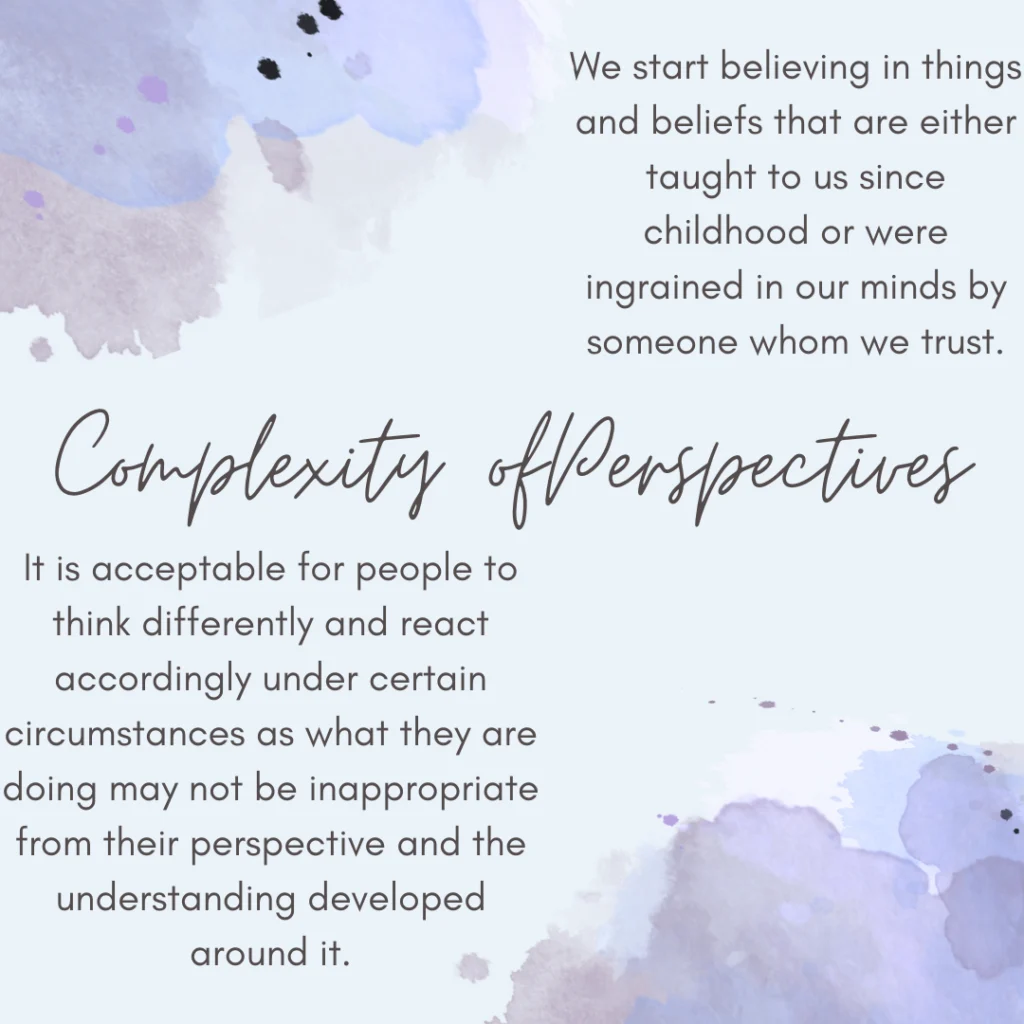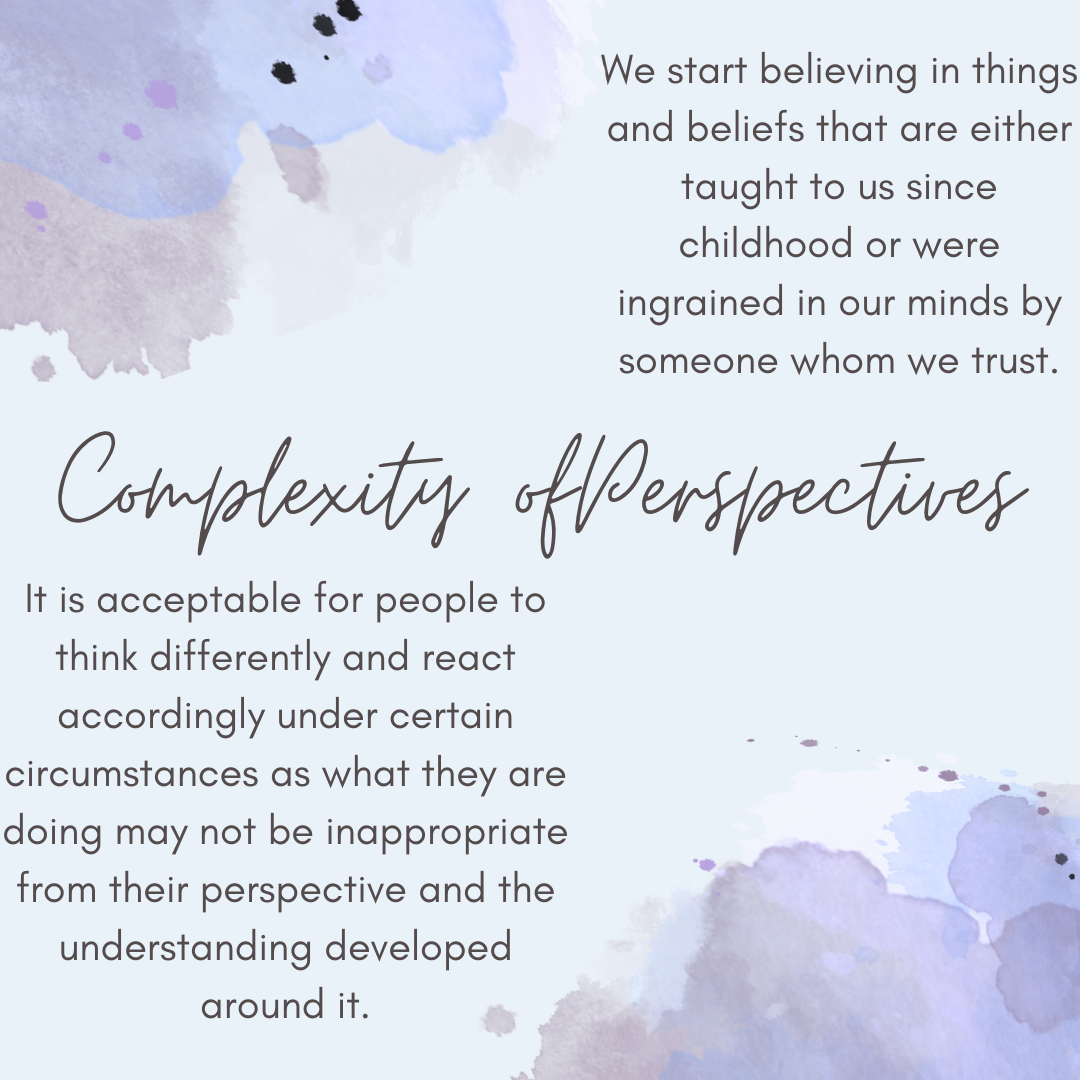The world would become a happier place to live if everybody started perceiving things in the same way, but in actuality, this is unrealistic, Isn’t it? Have you ever wondered why the thoughts and perspectives of people don’t always align with each other? Be it someone from a distant acquaintance or a close dear one, many times it becomes difficult to find a common ground of understanding among each other.
A piece of abstract art can invoke different emotions and interpretations when seen by viewers having diverse perspectives, and that’s exactly how each mind is trained to function, right? We start believing in things and beliefs that are either taught to us since childhood or were ingrained in our minds by someone whom we trust, and that’s why if we hear someone opposing our beliefs and convictions, we tend to disagree with their words.

It is acceptable for people to think differently and react accordingly in some circumstances as they believe they are not doing anything inappropriate as per their perspective and understanding developed around it, but in certain scenarios, it may lead to a conflicting situation.
What is your Perspective?
If you often find yourself in a complex situation where you’re caught up in an argument or a conflict without knowing the underlying root cause then it is important to figure out what transpired. Often, I experience such situations at home where a small argument quickly escalates into a big matter, and I have no idea about what actually happened?
Returning home after the office, commuting for almost two hours in heavy traffic, tired and defeated, with the thought of finding some peace at home, I get caught up in an unexpected situation. Having no clue about what happened that led to this uneasy situation at home, but the silent atmosphere that gets created adds to my stress. It becomes challenging for me to discern the underlying cause and understand the details of the situation, and after such exhaustion, I don’t have the strength to do anything to resolve this.
The time that you intended for relaxation turns out to be a period of added stress and from the silent ambiance of the house, one can sense that something is amiss; there are distinct vibes in the air. It is a challenging situation to deal with, but at the same time, it becomes important for me to settle down the situation to restore normalcy to the dynamics of the household. It becomes crucial to learn the perspectives of others so that you can grasp the situation from all angles.
It may be common for many readers who deal with similar situations in their households and might wonder how to tackle such circumstances in a way that brings harmony and peace.
What does perspective mean in life?
The simple word for perspective is a point of view or viewpoint, and sometimes understanding other’s perspectives is important so that you don’t make crucial life decisions based solely on your one-sided and limited thinking. When you observe anything, you develop a perspective around it, which can limit your thinking to only what you’ve perceived. As a result, you might not be able to think beyond and explore broader possibilities.
But when we attempt to look at the same thing from someone else’s perspective, we discover aspects that our mind never considered. It is said that half knowledge is equivalent to no knowledge – this is applicable here as well. That’s why, it’s essential to grasp the perspectives of others while thinking and developing your own perspective around a situation if you want to make correct decisions that can help peacefully resolve any problem.
Is perspective a way of thinking?
Perspective is closely related to mindset, your perspective largely depends on the way you think, and your thinking is shaped by your upbringing. Since birth, the environment in which you’ve been raised and the people around you have significantly influenced your thoughts. The culture you live in and the customs and traditions you follow greatly impact your thoughts. What you’ve learned from your elders and your personal experiences shape your mindset in life. So, your thinking aligns with the way you see things from your perspective.
Why it is important to understand others’ perspectives?
Sometimes you find yourself in a situation where you lack details about what’s happening around you, and you can’t avoid being pulled into that situation as the people involved are the ones whom you care about the most. In such circumstances, picking up one side may disappoint the other.
Imagine yourself as a captain of a team suffering from internal conflicts between the players. In such scenario, the captain cannot just pick any one player and make biased decisions to resolve the conflict, as it may result in weaker connections and poor leadership. Similarly in household matters, you need to bring a balance to the relationship equilibrium so that people can come together instead of driving apart.
Understanding others’ perspectives helps in:
- Understanding their views: You get an opportunity to understand the viewpoints of others, thus getting more insights and details about the conflicting situation.
- Preventing the situation from getting worse: By understanding the perspectives of others, you can help those involved in the situation calm down a bit, so that the situation doesn’t escalate further.
- Broadens your thinking: Your thinking doesn’t remain one-sided, collective thinking can be engaged by understanding other’s viewpoints which can lead to better decision-making, thus resolving the conflict.
- Handling things maturely: Things can be handled maturely as you can gauge what can be done right to handle the situation peacefully and things that can be avoided in the future to prevent such circumstances from reoccurring.
- Clearing confusion and misunderstandings: Many things become transparent thus eliminating unnecessary confusion, and misunderstandings can also be cleared by making people understand other’s perspectives.
- Thinking logically: Thinking logically and getting a sense of what might have actually happened and the underlying reasons behind it can help you devise an approach to peacefully resolve any problem.
Gaining a new perspective: You gain a new perspective where your limited knowledge about the conflicting situation gets enlightened which helps you think about better resolutions. - Improved decision-making: A better understanding of other’s perspectives enhances your decision-making ability to make morally correct choices and regain control over the situation.
- Gaining Trust: It helps you gain the trust of others as you empathize with them by listening to their perspectives and getting to know things from their point of view.
- Finding the root cause: You can delve into the root of the situation by gaining an idea of the actual root cause that needs addressing.
- Synced Harmony: Lastly, understanding perspectives can help achieve synched harmony that focuses on motivating people to work together in synch for a peaceful existence together.
What is the best way to understand the perspectives of another person?
Knowing someone’s perspective isn’t always that simple. If you think people will directly and clearly state their perspective when asked, then this might turn out to be a wrong assumption about the situation. Due to heated arguments, people can be frustrated already, and interrogating them at the wrong time could worsen the situation further, but trying the below-listed approaches might help here:
- Wait for the right moment: Let the situation cool down a bit on its own, and initiate a conversation with individuals only after that.
- Hold off the conversation: Don’t engage in a conversation with someone unless they are not in the mood to conversate, it’s better to hold off on the conversation if necessary.
Listen patiently: Just listen to them patiently and allow them to open up and speak out their emotions and feelings. - Acknowledge their views: Keep your response neutral and acknowledge their views either by nodding your head or using any other way to show that you’ve heard them.
- Don’t skip to conclusions directly: Don’t jump to immediate conclusions; take some time to understand the situation from all lenses.
- Talk separately: Before having a face-to-face conversation between the opposing parties, it might be a good idea to talk to them separately one-on-one, providing a safe environment where they can speak openly.
- Note important points: Write down on a piece of paper about their concerns and their expectations around them.
- Identify their Mindset: Try to understand their mindset and make an effort to relate it with the situation and the perspective formed around it.
- Get to know the insights: Build their trust and try to uncover their inner thoughts. Ask them questions in a way that allows them to be comfortable sharing more insights about the situation with you.
Rory Sutherland: Perspective is everything
How perspective taking can resolve conflicts?
When we talk about conflict resolution, our intention is not to arrive at a conclusion based on our own thoughts and views to prove one person right and the other wrong. Conflict resolution means understanding the issue from everyone’s perspective and bringing opposing parties to a common ground for a peaceful resolution. A good leader is someone who can make their people understand that progress is not made through conflicts and getting separated for individual gains, rather, it is about working together to move forward in life.
During conflicts, understanding others’ perspectives matters, It is important not just for you, but for everyone involved in that situation.
- First and foremost, it’s important to understand the pain areas of others that need to be addressed and also understand the expectations they have around them.
- Second, you should perceive things from their perspective and figure out where things might have gone wrong and at the same time get an idea of what needs to be done to improve the situation.
- Lastly, become better at forgiving people and move ahead in life. You also try to convey the same thing to others about what has happened, is done now, let it go, and move ahead in life. Forgiving, forgetting, and moving on is often the best approach in many circumstances as it allows peace and harmony to subside.
Conclusion
To conclude, others’ perspectives can vary, and during the process of understanding their perspectives, it is possible to comprehend their mindset. If you can motivate people on the right path and gain their trust with empathy and proper guidance, their perspectives and mindsets can undergo a positive change. People aren’t inherently right or wrong; it’s about how their thinking has been shaped in one direction. Please let me know in the comments section how understanding other’s perspectives can be helpful in resolving conflicts.
FOLLOW Synched Harmony Join our vibrant community for daily inspiration. Swipe-Up to follow for more related content.


1 thought on “Understanding Other’s Perspective – 10 Valuable Benefits”